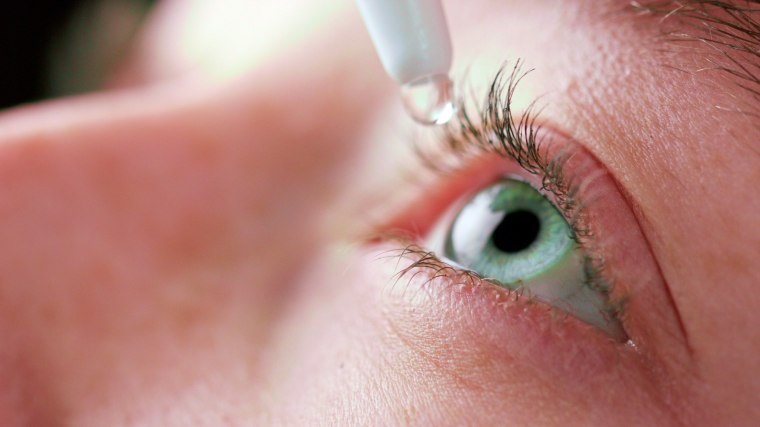The Food and Drug Administration recently cautioned consumers against using 27 different kinds of eyedrops — its third eyedrop-related warning this year — leading Americans to question whether any drops are safe to use.
On Wednesday, the FDA said that pharmaceutical company Cardinal Health was recalling eyedrops sold under the Rugby brand after it received three reports of blurry vision, vision loss and burning eyes.
Overall, however, experts say that artificial tears are not dangerous provided that consumers are aware of what they're putting in their eyes, and take certain precautions while doing it.
"Any lubricating drop that has not been recalled and is still available on pharmacy shelves should be perfectly safe," Dr. Christopher Starr, a spokesperson for the American Academy of Ophthalmology, wrote in an email.
Autumn, with its emergence of cold, dry air and proliferation of ragweed and other allergens, is peak eyedrop season, experts say. At least 117 million Americans used eyedrop products in 2020, according to Statista, a data research company. The group expects that number will rise to more than 123 million in 2024.
In 2023, however, the FDA came out with several dire warnings about contamination of these commonly used products.
- In January, the Centers for Disease Control and Prevention said people should stop using EzriCare Artificial Tears pending an investigation into bacterial infections linked to the product. Within months, it was discovered that 81 patients had been infected with a rare strain of drug-resistant bacteria called Pseudomonas aeruginosa. Fourteen were blinded, four had to have an eyeball surgically removed, and four people died. EzriCare Artificial Tears and two other products from the same manufacturer, Delsam Pharma's Artificial Tears, and Delsam Pharma's Artificial Ointment, were recalled. There have been no additional reports of injuries since May.
- In August, the FDA said it had discovered fungal and bacterial contamination of Dr. Berne's MSM Drops 5% Solution and LightEyez MSM Eye Drops-Eye Repair. The products contained methylsulfonylmethane, or MSM — a chemical not approved for use in eyedrops. No injuries associated with the drops were reported.
- Earlier this week, the FDA warned against using 27 different kinds of generic eyedrops after inspectors discovered bacteria in the facility used to manufacture those products. The drops were sold at major retailers, including CVS, Rite Aid, Target and Walmart, and have since been pulled from store shelves.
Experts and health officials are concerned about the risks from using the drops.
"We urge consumers to stop using these products, as it could result in an eye infection," the FDA said in an emailed statement.
It is unclear what prompted the agency to look closely at this particular facility, which has not been named.
Why are eyes so fragile?
When bacteria enter our bodies through cuts in the skin or through food we eat, our immune systems are trained to kick in. White blood cells surge to form scabs. Stomach acids attack.
But eyes are particularly vulnerable to foreign invaders. They "don't have that level of protection," said Dr. Morgan Morelli, assistant professor of medicine at Case Western Reserve University in Cleveland. "You're putting the product straight onto the eye."

An outer layer of the eye, called the corneal dome, does not have blood vessels that are usually critical in the immune system process because the eye "has to maintain a crystal clarity," said Dr. Ronald Benner, president of the American Optometric Association.
When allergens prompt people to rub and itch their eyes, it can cause tiny scratches on the surface of the eye, opening the door wide for bacterial infections.
"When you have an infection in that tissue, the body can't fight it as quickly," Benner said. "Putting a drop in that's contaminated makes things worse."
Pro tip: Don't use generic eyedrops
Given the recalls, experts say the first thing consumers should do is check their medicine cabinets, purses, desk drawers, junk drawers and any other places eyedrops may be kept. This is a list of the latest drops the FDA says to stop using.
Experts also recommend using only brand name eyedrops and other artificial tear products.
"There are some generics out there that are probably fine and safe, but you never know where they are manufactured," Benner said. "You never know how long they've been on the shelf."
Morelli agreed, even though brands tend to be more expensive than generics. She said she paused recently when faced with spending $30 on eyedrops for herself. "When it comes to the eyes, you're probably safer spending more money and going with a brand name," Morelli said.
Starr, also an associate professor of ophthalmology at Weill Cornell Medicine in New York, reminds all patients to check the expiration dates on eyedrop bottles.
"If expired, please discard them, as there is a higher risk of contamination even with nonrecalled, well-manufactured eyedrops," he said.
Other expert tips:
- Wash your hands before using eyedrops.
- Make sure the tip of the eyedropper does not touch anything, including your hands, even if they're clean. This includes any part of the eye, including the lashes.
- Check to make sure eyedrops are labeled as "sterile" and that they are not expired.
- Do not share bottles of eyedrops, even among family members. "We do see eye infections spread from person to person," Benner said. "Your drops should be your drops. They're not to be shared with anybody else."
Follow NBC HEALTH on Twitter & Facebook.
